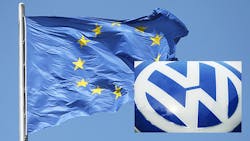Volkswagen AG’s dieselgate scandal took another turn as the European Union threatened to sue Germany, the U.K. and five other nations for failing to set up penalty systems to deter manufacturers from violating car emissions rules.
It’s the first legal action from the European Commission since the news broke about Volkswagen’s cheating on tests for smog-causing emissions a year ago. The regulator has been battling with the carmaker separately over compensation for EU car owners who had been affected by VW’s admission that it used software on about 11 million vehicles worldwide that allowed it to cheat on pollution tests.
“Abiding by the law is first and foremost the duty of car manufacturers,” EU Internal Market Commissioner Elzbieta Bienkowska said in a statement Thursday. “But national authorities across the EU must ensure that car manufacturers actually comply with the law.”
The EU said Germany and the U.K. broke the law by refusing to disclose, when requested, all the technical information gathered in their national investigations regarding potential irregularities with nitrogen-oxide emissions in cars by VW and other manufacturers on their territories.
Germany “is the only country in Europe which presented a set of measures, including immediate measures to stop defeat devices,” its Transport Ministry said in the e-mail. “VW was ordered to fix the cars at its own expense so that they comply with existing rules.”
Spain’s Justice Minister Rafael Catala told journalists at a press conference in Brussels on Thursday that the industry ministry already started “probes that eventually may end in sanctions” for Seat, VW’s Spanish arm.
The commission sent letters of formal notice on Thursday to the Czech Republic, Lithuania and Greece for failing to introduce penalty systems for breach of EU emission rules in their national laws. It also opened infringements against Germany, Luxembourg, Spain and the U.K. for not applying such sanctions despite VW’s use of illegal software. Those four countries issued car-type approvals for the German company in Europe.
The EU regulator “is finally waking up after the dieselgate scandal,” said Gerben-Jan Gerbrandy, a Dutch Liberal member of the European Parliament. “It is high time to protect European consumers, fine illegal actions and start mandatory recalls of highly polluting vehicles.”
VW’s cheating, which the U.S. uncovered and led Germany to order an EU-wide recall of 8.5 million Volkswagen vehicles, has left policy makers in Europe scrambling to patch up regulatory holes that threaten a “clean-diesel” strategy dating to the 1990s. The issue is politically thorny in Europe because more than half the cars in the region are powered by diesel — which causes more urban pollution than does gasoline while having less global-warming impact — and because many member states have struggled to meet clean-air goals meant to reduce human sicknesses and premature deaths.
The governments have two months to respond to the commission. If they fail to do so, the EU can send a final warning before taking them to the EU courts in Luxembourg.
By Ewa Krukowska and Stephanie Bodoni, with assistance from Jonathan Stearns, Birgit Jennen and Esteban Duarte.
About the Author
Bloomberg
Licensed content from Bloomberg, copyright 2016.
